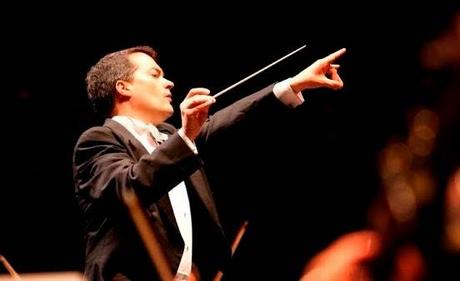
Conductor Jacques Lacombe.
Photo by Fred Stucker © 2014 New Jersey Symphony Orchestra.
The NJSO is unique in that it is an orchestra that is effectively "on tour" for most of its season, playing programs in Newark, Bergen, New Brunswick, Princeton and even Red Bank. But their home is still Newark, at the stately, modern New Jersey Performing Arts Center (NJPAC) right downtown on Center Street.
In a telephone interview with Superconductor, Mr. Lacombe discussed the benefits and challenges of his position, and how working out of Newark, New Jersey might be better than you think.
Superconductor: So how are things in Newark? Jacques Lacombe: Newark is changing now so quickly! You see people on the streets. You see children playing in the refurbished Military Park (across the street from the New Jersey Performing Arts Center and re-opened earlier this year.) You see it changing in a positive way. That said, we have the most magnificent halls. In a lot of concert halls you get more clarity above the orchestra, and you still get the impact of the sound and the power. And in some halls the balconies are too wide. But not at the PAC.
S: What are the challenges of playing the same program in multiple locations during a week of performances?
J.L.: In any given week we can play three or four different venues. That requires a quick ability to add depth to the orchestra, "on the tip of a coin." There are some combinations that are a bit harder to deal with. If we book princeton, that's a smaller stage and everyone is crowded. We get back to the PAC and things are spread out--it takes more work to balance the orchestra. It's always interesting.
How would you describe the sound of the New Jersey Symphony Orchestra?
J.L. :I would describe it as warm, deep and...what is the word...flexible.
Tell us some more about the Shakespeare Festival?
J.L. : This year and the next year is the celebration of Shakespeare's birth and in terms of inspiration from literature the list of plays and poems by Shakespeare and poems is endless. There are many different layers of his work. I decided to use that as the means for this season and next season to use that time of the year (the orchestra's January festival) to explore different ways of presenting music and different art forms.
For example, we are doing Romeo and Juliet with the Shakespeare Theater of New Jersey and the music of Prokofiev. Sometimes you will have the music and the music playing under some of the text, at other times you may just have the text. This is our second collaboration--our first was Sibelius' The Tempest.
We're going to have Sarah Chang in residence also, playing the West Side Story suite. There will be interaction with kids and the music schools and we are also trying to include lesser know n works: the Tchaikovsky Romeo and Juliet again with the tenor and the soprano, Falstaff by Elgar, and Korngold's (incidental music from) Much Ado About Nothing.
What has your philosophy been in choosing programmes?
J.L.: I love to expose people to lesser known works from the past and also for the orchestra we often play Enigma and there's nothing wrong with that. But in our upcoming Shakespeare festival we're playing Elgar's Falstaff and that is a new work for the orchestra.
In the case of the Prokofiev it's slightly different. The music is so well done that when you conduct for ballet there'salways this issue with tempo with dancers. In the case of Romeo and Juliet I've never experienced any worries in terms of finding the right tempo.
What was it like preparing, performing and recording the Verdi Requiem?
J.L.: We didn't really plan originally to release a recording. We did the performances and it was so good that I thought it might be material for a potential CD. We taped two performances--and we usually have to do some editing. But I listened to both tapes and there was very little editing to do. The soloists were extraordinary so I said: 'let's try to make this happen.
You opened the 2014 season with Carmina Burana. Is it easier or more difficult to add singers to an orchestra?
J.L.: Working with voices in general ties to my activities as an opera conductor. This is something I like to do. I very often think of myself as a "European" type of conductor--in Germany a lot of conductors come from the opera world. They start as singers, and then chorus masters, and then conductor. I feel very comfortable working with choruses because I was a member of a choir when I was younger. So many conductors don't have that knowledge.

